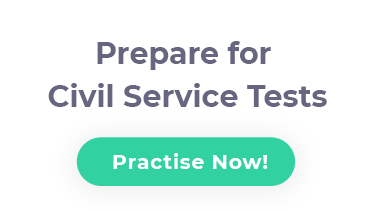Department for Education (DfE) Assessment Tests, Recruitment Process & Interviews Online Preparation – 2024

What Is the Department for Education?
The Department for Education (DfE) in the United Kingdom is the ministerial department responsible for children’s education and services. The DfE is supported by 18 agencies and public bodies, with staff mainly based in London but with other locations around England. The DfE has several responsibilities, including:
- Teaching and learning for students in primary schools, secondary schools, higher education, apprenticeships, traineeships, and further education
- Supporting professionals who work with students of all ages
- Helping disadvantaged students achieve more
- Making sure local services protect and support children
There are also multiple priorities for the department, including driving economic growth, improving education standards, and supporting vulnerable children.
Working for the UK Department for Education
At the heart of the UK Department for Education is a department that recognises and realises potential. That doesn’t just stop at the students; they realise potential in their employees as well. They offer various roles with opportunities for seasoned professionals and recent graduates. Here are a few areas and opportunities available at the DfE:
- Administration: The administration department takes care of day-to-day operations. Roles in this area include Executive Assistants, Workforce Planning and Resourcing, and Data Stewardship Officers.
- Commercial: The commercial department focuses on the business side of operations. These roles include Business Analysts and Digital and Technology Business Analysts.
- Communications: The communications department focuses on external communication with the public. These roles include Media Officers, Content Producers, and Communications Managers.
- Delivery: The delivery department works to ensure that products and projects are delivered on time and within budget. Some roles in this department include Project Managers, Case Managers, Service Advisors, and Design Leads.
- Digital: The digital department handles the software needs for the DfE. Roles here include Application Support Engineers, Software Developers, and Software Test Engineers.
- Finance: The finance department handles funding and budgeting. The roles here include Accountants, Funding Coordinators, and Assurance Officers.
- Policy: The policy department ensures that policies to benefit children and their education are created and enforced. The roles in this department include Planning, Risk and Governance, and Strategic Resource Planners.
- Research: The research department conducts research to benefit the educational programmes and policies. Some of the roles in this department are User Researchers and People Analytics Managers.
No matter the role you are in, the DfE looks for employees who have strong communication skills, motivation to find unique solutions and create change, and passion for making a difference in education.
What Is the Recruitment Process at the DfE?
Online Application
There are several types of job opportunities available at the Department of Education, including full-time, part-time, job share, and flexible working roles. To find a position that suits your skills and goals, go to the Civil Service Jobs page and filter by DfE.
In addition to the standard application form that asks for contact details, educational history, and professional experience, the DfE application will ask job seekers to submit a CV and a personal statement.
The CV should be a maximum of two pages and tailored to the role you are applying for. It should include only skills and experience that are relevant to the position. Review the job description and requirements and add those key elements to your CV where appropriate. Lastly, before uploading your document, check for any spelling and grammar mistakes. The DfE is looking for candidates with solid attention to detail, so your submitted CV should be error-free.
The personal statement should be a maximum of 1250 words and should detail how you meet each of the criteria listed in the job description. Providing evidence for how you meet each requirement will help the hiring team understand that you are qualified for the position. The statement should be well-structured, clearly worded, and concise. Review your statement before submitting it to remove errors and ensure it makes sense to the reader.
DfE Aptitude Tests
The hiring team will review your CV and personal statement to ensure you are qualified for the position. Those who pass this initial screening process will take aptitude tests to confirm their skills and technical capabilities.
Verbal Reasoning Test
The first test is the verbal reasoning exam. This will assess your ability to read, comprehend, interpret, and apply information. No matter what role you have within the DfE, you will need to have good verbal and written comprehension and communication skills.
This exam tests these abilities by presenting several text passages that you must read through. These will be followed by several multiple-choice questions about the information you just learned. Some questions will be about the word usage, spelling, and grammar within the passages, while others will be about conclusions you can draw from the text.
For example, it is common for these tests to include questions that present a concluding statement, which you must decide if it is true, false, or if there is not enough information to determine either way.
This exam is timed, so you’ll need to read through the text and questions quickly to finish within the time limit. One thing you can do to help save time is read through the questions ahead of the text; that way, you will know what information you are looking for while reading and won’t focus on unnecessary details.
Numerical Reasoning Test
The other psychometric test you will take is the numerical reasoning test. This exam will assess your ability to work with numbers and mathematical concepts, such as:
- Addition
- Subtraction
- Multiplication
- Division
- Ratios
- Percentages
- Sequences
- Currency conversions
- Arithmetic
- Algebra
- Geometry
The test will likely include word problems and equations that need to be solved using basic calculations. You’ll also receive data presented in tables, graphs, or charts that you must interpret and apply to answer questions.
The numerical reasoning exam is multiple-choice and timed. Therefore, you’ll need to work through the problems quickly and accurately to do well on the exam.
DfE Interview
The last stage of the process is the interview. This conversation will likely be conducted virtually through a web conferencing platform like Microsoft Teams or Zoom. The interviewer will examine your qualifications and their alignment with the role requirements. Review the job description again before the conversation so you will be prepared to answer these questions.
The interviewer will also ask behaviour-based questions to learn more about your values and if you will fit in with the department’s culture. For these questions, you’ll want to review the competencies that they are looking for in an applicant and highlight these in your responses. To ensure your answers are well organised, you may want to format them using the STAR method: Situation, Task, Action, and Result.
How to Prepare for the Department for Education Assessment?
The UK Department for Education is looking for skilled individuals who can contribute to its mission of improving education for children and young people. However, even if you meet all of the desired qualifications for the role, you should still prepare for the hiring process to ensure your best chance of being hired.
The assessment stage of the recruitment process is a critical step because applicants are screened out at this stage if they do not have the skills required to do well on the exams. Therefore, to show the hiring team that you would do well in the position, you must do well on the tests.
Online resources such as practice tests are excellent preparation tools. These will not only allow you to answer sample questions to give you a feel for what will be on the test but will also allow you to rehearse your timing to ensure you can complete the test within the time limit. These practice tests will also give explanations for each question, allowing you to see precisely why you answered a question correctly or incorrectly.
Candidates who prepare for the pre-employment process tend to do better than those who do not. Give yourself the best chance of success by studying and preparing for the exams.

